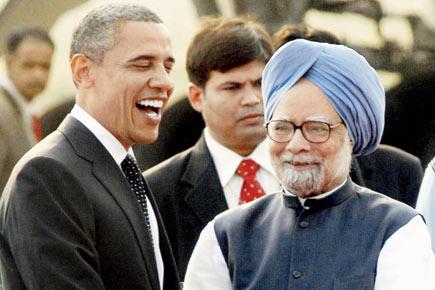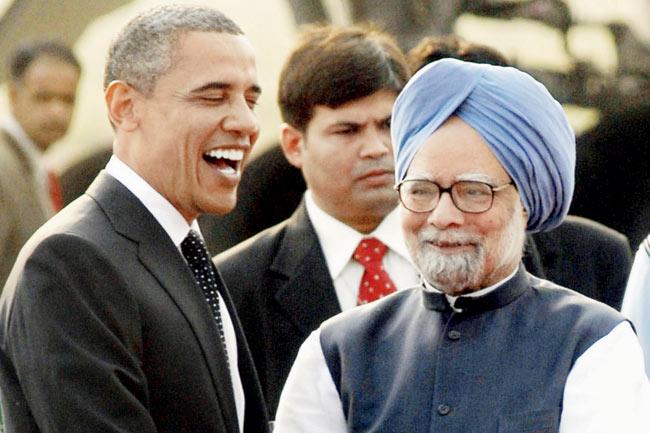We are upset that India was not mentioned by President Obama in his State of the Union address. It is seen as a fall or a redefining of a relationship that was the flavour of the times till not so long ago


ADVERTISEMENT
We are upset that India was not mentioned by President Obama in his State of the Union address. It is seen as a fall or a redefining of a relationship that was the flavour of the times till not so long ago.

Indecisive Leadership: India deferred to US policies on sanctions on Iran, only to find that today, the US President threatens to veto any further sanctions against Iran
Indo-US relations saw both, their highpoint and the steady downslide in the two terms of the UPA government. The Khobragade affair was more than just a mixture of hubris, ambition, insensitivity and bureaucratic mismanagement. It was perhaps symptomatic of patience running out on both sides. Differences on regional security interests, the nuclear liability bill, trade and climate remained major issues of mutual disagreement while Corporate America was considerably disillusioned with Indian policies.
We did not select our next generation fighter aircraft from the US even though we did buy other substantial military hardware. Our inconsistent economic policies, taxation with retrospective effect, excessive rights-based populist policies without the means to pay for them, and scams frightened away FDI and other investments. Investor confidence declined and our performance ratings slumped.
US Federal Drug and Civil Aviation authorities have commented adversely on our systems. Some Indian car manufacturers have been judged to be producing cars with substandard safety features. India no longer made waves at Davos. With a growth rate of less than 5 per cent for next year, let us not blame others for this disinterest. With our inability to finalise some defence deals while messing up other deals, we come across as a confused people led by an indecisive leadership.
We deferred to US policies on sanctions on Iran, only to find that today the US President threatens to veto any further sanctions against Iran. We did not use this period to further strengthen our relations with Israel, our strongest partner in the region for our essential strategic needs, yet no Indian head of state or PM has even visited Israel. We were excluded from Afghanistan for a long time because of Pakistani sensitivities and are now grudgingly admitted in a limited way to help US leave. There was unhappiness in Washington and New Delhi as to how each looked at events in Bangladesh. We held our ground here.
We need not wallow either in self-pity or suffer from a persecution complex because of US policies. For America it has always been America first, with the ability in the past to enforce this. This essentially meant American business interests first, whether it is Microsoft, Monsanto, Lockheed Martin, Boeing or Walmart. Annoy this segment and you have annoyed all of America.
We may not be ready to be any pivot against China or be an ally against any one else but we need to learn from the way China and America handle their relationship, which is marked by acute and wide ranging differences on strategic, military, political and financial issues yet have a bilateral trade worth $ 510 billion in 2013, with considerable maturity.
China and US are looking at possibilities of cooperating in Afghanistan and for ending the conflict in South Sudan.
In a few months we will have a new government and it is unfair to expect any new thinking by the political leadership till it settles down to governance. There are certain aspects of our relationship that will be a constant, no matter which government is in power later in the year.
India and the US will perhaps never fully share all strategic and security interests. There are differences on trade and climate issues; we see regional threats to us and our regional interests differently. Naturally, we have differences on how these are to be handled. India needs to curb the tendency to acquiesce to US policies in the hope that we will get some good conduct bonus. The US must learn to accept the differences as inevitable and not meant to be anti-US.
These differences should not therefore hold us back on other economic, market and technology interests.
The next government will have to reorder policies and priorities, without bureaucratic hindrance and with procedures that are streamlined and not subject to whimsical changes. The next decade is crucial for our young population; rights oriented populism will have to cede to growth and production oriented policies to attract investment. We need to look ahead as we will need all possible cooperation, careful realistic planning and perseverance to become a reasonably strong manufacturing country in the next ten years. We just need to sort out our own act.
The writer is a former chief of Research and Analysis Wing (RAW)
 Subscribe today by clicking the link and stay updated with the latest news!" Click here!
Subscribe today by clicking the link and stay updated with the latest news!" Click here!






